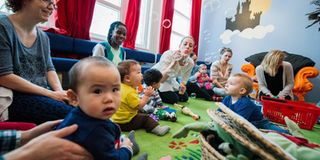Sweden: migrant oasis under strain

Mothers with their babies at Sollentuna library on February 4, 2015. In this suburb outside Stockholm, a group of immigrants are trying to learn Swedish and integrate into society. The influx of refugees is putting a heavy burden on Sweden's famed cradle-to-grave welfare system and testing social integration. PHOTO | JONATHAN NACKSTRAND | AFP
What you need to know:
Sweden is one of the largest and most secular countries in Europe
It had an open refugee policy even before the migration crisis hit the continent in 2015
Social Democrats have dominated Swedish politics since the 1930s
It is a pioneer in gender equality with generous maternity and paternity leave
STOCKHOLM,
The Nordic nation of Sweden, which stretches into the Arctic Circle and is home to reindeer-raising indigenous people, is a generous welfare state but under strain from a refugee influx.
Ahead of legislative elections on September 9, here is some background about the Scandinavian country.
SWEDEN
One of the largest and most secular countries in Europe, Sweden has a population of 10 million, with around 80 percent living in cities.
It had an open refugee policy even before the migration crisis hit the continent in 2015, and 18.5 percent of its 2017 population was foreign-born.
The European Union member registered more than 394,500 asylum applications between 2012 and 2017, a record per capita for Europe, with the peak of 162,000 in 2015.
More than 60 percent of claims processed during this period were accepted -- although they were not necessarily applications submitted during that time, because of delays in the system.
The influx is putting a heavy burden on Sweden's famed cradle-to-grave welfare system and testing social integration.
BORDER CONTROL
Under pressure, the country in 2015 reestablished border controls and toughened its immigration policies.
Social Democrats have dominated Swedish politics since the 1930s, building one of the world's most advanced welfare models funded by high taxes.
But it also has a strong competition-based economy, home to global groups including Electrolux, Ikea, Saab, Volvo, Skype and Spotify.
Sweden was ranked seventh on the World Economic Forum's Global Competitiveness Index in 2017-2018.
It is a pioneer in gender equality -- with generous maternity and paternity leave -- environmental protection and organic farming.
ARCTIC CIRCLE
The country is also increasingly moving towards becoming a cash-free society.
The 1986 assassination of charismatic prime minister Olof Palme while he was walking home from a Stockholm cinema remains unsolved despite thousands of leads.
The murder sent shockwaves through the normally peaceful country.
Memories of Palme's shooting were revived in 2003 when foreign minister Anna Lindh was stabbed to death by a mentally unstable man in a Stockholm department store.
Sweden's position near the Arctic Circle means not only long summer days but also long winter nights, a climate that lends mood to a tradition of dark crime novels.
SAMIS
Its "Nordic noir" genre includes Stieg Larsson's best-selling "Millennium Trilogy" and Henning Mankell's Wallander series, both adapted to global hit TV shows and movies.
The 2011 Danish-Swedish TV thriller "The Bridge" has been broadcast in more than 100 countries.
Striking a much brighter note, disco supergroup ABBA arguably remains Sweden's most well-known music export.
The Samis, formerly known as Lapps, have lived mainly above the Arctic Circle with their herds of reindeer for millennia.
Today numbering 20,000-40,000, they face modern-day threats to their livelihood with their land given over to mining and logging, and encroached upon by wind turbines.
The Sami are the only people authorised to herd Sweden's 225,000 to 280,000 reindeer, but just 10 percent of them today earn a living from their herds, others relying on tourism, fishing and crafts, and some moving to urban areas.
Sources: AFP, Swedish official website www.sweden.se, World Economic Forum





